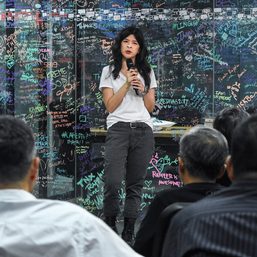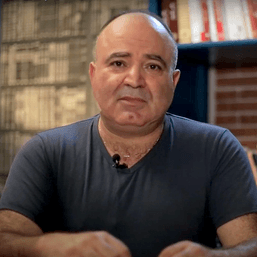SUMMARY
This is AI generated summarization, which may have errors. For context, always refer to the full article.
![[New School] What I learned from the sitcom ‘Great News’ as an aspiring journalist](https://www.rappler.com/tachyon/2022/09/Screen-Shot-2022-09-12-at-2.01.49-PM.png)
Being an avid reader from my elementary days, I had always known that I wanted to write for a living. It was a no-brainer for me; I was always ready with an answer whenever anyone asked me what I wanted to be when I grew up.
But as I got older, I noticed that I never really had a medium in mind. Those around me knew they wanted to author books or compose poems, but I just wanted to write. Broad, yes; a huge problem for me back then, also yes. It’s safe to say that I was having an existential crisis at 12 years old.
Sure, I enjoyed writing academic papers on social issues, but of course, I couldn’t do that forever. I loved learning about new things and interesting people, too, as vague as this sounds. Looking deeper into my affinity for these painfully general interests, I eventually stumbled upon a beautiful thing called journalism.
In my free time, I naturally scoured Netflix for films and shows related to reportage – and that’s when I found a sitcom called Great News. It’s a humorous series that follows a middle-aged woman named Carol, who attempts to fulfill the dreams she had to put on hold when she gave birth to her daughter Katie, who is now a journalist. Coincidentally, Carol lands an internship at Katie’s news station, The Breakdown, and in the best way, their workplace has never been the same since.
While Great News might not have offered an entirely accurate depiction of newsroom dynamics given the absurd scenarios it portrays, it still taught me a ton of lessons that will come in handy once I hopefully begin working in journalism after graduation.
You can never be too old for journalism
Carol’s fellow news interns were young enough to be her children, so she had to work twice as hard to catch up with the fast-paced nature of journalism. After a few big blunders, Carol began to feel discouraged – thinking that maybe she had started a little too late. However, as Chuck, the veteran news anchor put it, “Dreams don’t have an expiration date.”
My situation can’t exactly be compared to Carol’s, but I had always felt like I was a late bloomer. I never participated in campus journalism in high school because I was an anxious teen who had zero self-confidence. But I wasn’t ready to let go of that ambition just yet.
Although it did take a few years for me to build my confidence by taking formal journalism classes first, I finally mustered the courage to try out for my university’s official student publication in my junior year of college.
Even then, I thought about withdrawing my application multiple times. When I finally got around to submitting my application requirements, I spent days nervously awaiting the results. I kept thinking that my lack of campus journalism experience would instantly put me in the reject pile.
But like fate, I got accepted into the sportswriting staff. I officially started my journalism journey from there – all because the school paper’s editors decided to give me a chance, and I’ll forever be grateful for that.
Story pitch rejections are normal
My acceptance into the student publication was the calm before the storm. Big challenges were about to emerge in full swing already – and pitching stories was one of them. In Great News, Katie was hell-bent on working on a certain news piece. Unfortunately, though, her boss immediately rejected her pitch.
I’ve gone through the same thing. Rejection was a terrifying feeling that always got the best of me when I was just starting out, so it hadn’t been easy for me to not get bummed about failed pitches back then.
But I’ve since learned to simply move forward and repeat the cliché “Everything happens for a reason” to myself. It usually just means that a more profound story is coming your way.
However, there have been times when I refused to give up on an idea because its potential was oozing out and calling my name. Fueled by perseverance, I did what any reasonable writer would do – keep refining the pitch. If you’re really passionate about spotlighting a particular narrative, exerting a little extra effort to develop the piece even further shouldn’t be a problem.
The news never stops
But what should we do when some stories get to be a little too much? In one of the later episodes, everyone at The Breakdown had been preoccupied with an unexpected occurrence in the newsroom, which I won’t disclose to avoid spoilers. Even when they were all visibly shaken, they carried on because the news never stops.
Journalism is an extremely fast-paced industry that can spiral into chaos when our social milieu calls for it. Whether you like it or not, something is always bound to happen, and you have no choice but to face the music for the sake of your dedication to veracious reportage.
Despite the rapid flow of events and the need to deliver valuable information immediately, hastiness is never the answer. While being the first news outlet to report on an intriguing development is rewarding, carelessness can immediately tarnish your readers’ trust in you. After all, journalism’s first obligation is to the truth – not to speed.
It’s a draining but nonetheless fulfilling profession
Seeing Greg and Katie spend sleepless nights working on a single short segment seems silly, doesn’t it? But it really isn’t. The glory of producing a breakthrough story is masked by hours of grueling work and countless instances of starting over from scratch.
Even with all these measures in place, a hard truth I’ve had to accept is that not everyone is going to like what you produce in your pursuit of fearless storytelling. Amid the current political climate’s growing threats to humanity, amplifying the voices of those who have long been forced to keep silent is an indispensable commitment.
Setting Great News aside for a moment, my internship editor has also imparted to me a resounding conviction I haven’t been able to stop thinking about – if you’ve invoked discomfort among the comfortable, you’re doing something right.
And so to my fellow aspiring journalists, press on. – Rappler.com
Juno Reyes is a 4th year Communication student from the Ateneo de Manila University and a Life & Style and Entertainment intern at Rappler. When she isn’t studying or writing, she loves to read books, bake pastries for friends and family, and collect food-themed items. You may reach her at junoreyes95@gmail.com.
Add a comment
How does this make you feel?
![[New School] My ‘campus’ journalism experience](https://www.rappler.com/tachyon/2021/07/campus-journalism-July-22-2021.jpg?fit=449%2C449)


![[Rappler’s Best] Patricia Evangelista](https://www.rappler.com/tachyon/2024/04/unnamed-9-1.jpg?resize=257%2C257&crop=486px%2C0px%2C1333px%2C1333px)

![[Be The Good] Talking AI between ridge and reef](https://www.rappler.com/tachyon/2024/04/Talking-AI-between-ridge-and-reef.jpg?resize=257%2C257&crop=270px%2C0px%2C720px%2C720px)
![[EDITORIAL] Filipino journalists to China: Yes, we are trouble](https://www.rappler.com/tachyon/2024/04/animated-wps-march-tension-2024-carousel.jpg?resize=257%2C257&crop_strategy=attention)




There are no comments yet. Add your comment to start the conversation.